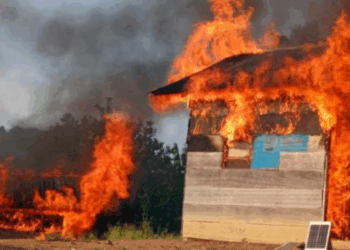Dr Stephen Goss is an historian, policy and research manager, and a Conservative councillor in Reading.
Bear in mind these dead:
I can find no plainer words.
I dare not risk using
that loaded word, Remember,
for your memory is a cruel web
threaded from thorn to thorn across
a hedge of dead bramble, heavy
with pathetic atomies.
So begins John Hewitt’s poem Neither an Elegy nor a Manifesto.
The Troubles ended more than a quarter of a century ago, yet its legacy remains unresolved. Successive governments have struggled over how to deal with the conflict’s consequences. How to offer justice to victims? How to deliver accountability for crimes? How to provide recognition of service? Most importantly: how to give closure to everyone affected?
In 2023, the Government legislated for a comprehensive settlement.
The Northern Ireland Troubles (Legacy and Reconciliation) Act was passed to definitively ‘draw a line’ under the past. It was opposed by victims’ groups, every party in Northern Ireland, the government in Dublin, and Labour. Following a meeting between the Prime Minister and the Taoiseach last week, it was announced that a deal between the British and Irish Governments on legacy issues was ‘very close’.
Why has it taken so long?
For years after the 1998 Agreement, legacy was the issue deferred.
Politicians spoke of peace, power-sharing, and prosperity, but the unresolved killings, the hundreds of remaining inquests, and the steady drip of judicial reviews told another story. Families pressed their cases through the courts. The Police Service of Northern Ireland (PSNI) struggled to balance today’s policing with the resource-hungry historical investigations. Civil actions multiplied, often consuming years and vast sums without resolution.
By the mid-2010s, pressure for a comprehensive approach became inexorable.
The 2014 Stormont House Agreement was the first serious attempt at a path forward. It proposed a Historical Investigations Unit, an Independent Commission on Information Retrieval, and support for victims. However, it was never implemented: mistrust between Northern Irish parties, disputes over disclosure, and concerns in London about the impact on veterans left the proposals gathering dust.
Many Conservatives, conscious of their commitments to service personnel, were deeply uneasy at the prospect of retired soldiers facing prosecution decades later for actions in the Troubles. The veterans’ lobby was vocal; ‘legacy prosecutions’ became a rallying cry in party conferences and backbench speeches. In parallel, victims’ families (particularly nationalists) were just as insistent that the state must not shield its own while pursuing paramilitaries.
The Government argued that the patchwork of inquests, civil suits, and police investigations was unsustainable. Victims’ groups countered that a line was being drawn under the past at their expense.
In 2023, ministers decided the time had come to legislate decisively. The Legacy Act was sweeping in scope. It replaced the myriad inquests, civil actions and police investigations with a single body: the Independent Commission for Reconciliation and Information Recovery (ICRIR). From May 2024, the ICRIR assumed responsibility for Troubles-related cases. The PSNI closed its historical investigations branch. Most controversially, the Act offered conditional immunity from prosecution. Individuals suspected of involvement in Troubles-related offences could avoid trial if they co-operated with the Commission and disclosed the truth about their actions.
The Government justified this on pragmatic grounds.
With decades passed since most incidents, evidence had degraded. Suspects and witnesses had died. Prosecutions, ministers argued, were rare, costly, and emotionally draining for families – often ending in acquittals. The legislation was not only about ending prosecutions. It was framed as a path to reconciliation: an information-recovery process to help families learn the truth about what happened, to acknowledge their suffering, and to provide some form of closure.
The Act met opposition from almost every quarter outside the Conservative benches. Labour opposed it outright. In Northern Ireland itself, all the major parties opposed the legislation. Their reasons differed in tone but not in substance. All argued that Westminster was imposing a settlement without the consent of local representatives, and that the Act placed the interests of perpetrators over victims.
Victims’ groups were scathing. For families who had fought for decades for inquests, civil actions, or even prosecutions, the closure of those routes felt like betrayal. The conditional immunity scheme was branded a de facto amnesty, letting killers and bombers escape justice. The Irish Government also objected, arguing the Act breached the UK’s obligations under the European Convention on Human Rights (ECHR).
Ahead of last year’s general election the Labour manifesto pledged to repeal the Act, but in keeping with their record in Government, they are simply tinkering with it.
Hilary Benn, now Secretary of State for Northern Ireland, announced a Remedial Order to strip out the most contentious elements.
It removed the conditional immunity scheme in its entirety. It also re-opened the door for civil proceedings. Benn has emphasised that the new government will not abandon victims in the pursuit of a tidy settlement. Instead, it would return to earlier principles – particularly those contained in the 2014 Stormont House Agreement, which had envisaged a combination of investigations, truth-recovery, and oral history projects. The ICRIR, meanwhile, continues to operate, albeit under a cloud of uncertainty. Some families have already engaged with it, submitting cases or testimony. Others are holding back, waiting to see whether it will survive in its present form.
So what is this deal on legacy likely to look like?
The Legacy Act was a unilateral British solution, but the next will be bilateral. Dublin’s role is important. The Agreement made the Irish Government a co-guarantor of the peace process. Without its buy-in, no settlement on legacy will be legitimate.
So what might a new UK-Irish agreement include?
The first principle will be to ensure that any new framework is compatible with the ECHR. That means proper investigations, effective remedies, and no blanket immunity. Future arrangements will have to place victims and survivors at the centre. Families want choice: whether to pursue an inquest, a civil action, or information recovery. They also want meaningful involvement in shaping the process, rather than being told after the fact. A recurring complaint has been the state’s reluctance to release sensitive files. Any new deal will likely expand disclosure obligations, giving the ICRIR or its successor stronger powers to compel documents and ensure transparency.
Successive Conservative governments made much of their commitment to veterans, many of whom served in Northern Ireland. Labour, too, will be conscious of their concerns. The balance must be struck between accountability for wrongdoing and fair treatment of those who acted lawfully under orders in difficult circumstances.
The Legacy Act was an ambitious attempt to close the book on the Troubles. But it was fatally flawed.
By prioritising tidy finality over messy justice, it alienated victims, angered parties, drew legal challenge, and lacked legitimacy. Labour’s current effort is not the end of the story. It is the start of another chapter – one that must be written in partnership with Dublin, with Stormont, and with victims’ groups. Success will mean creating a system that balances truth with accountability, fairness with compassion, reconciliation with justice.
That will not be easy. As Hewitt warns:
Bear these eventualities in mind also;
They will concern you forever:
But, at this moment, bear in mind these dead.
Without dealing with the legacy, the ghosts of the past will continue to stalk the politics of the present.





![ICE Arrests Illegal Alien Influencer During Her Livestream in Los Angeles: ‘You Bet We Did’ [WATCH]](https://www.right2024.com/wp-content/uploads/2025/08/ICE-Arrests-Illegal-Alien-Influencer-During-Her-Livestream-in-Los-350x250.jpg)
![Gavin Newsom Threatens to 'Punch These Sons of B*thces in the Mouth' [WATCH]](https://www.right2024.com/wp-content/uploads/2025/08/Gavin-Newsom-Threatens-to-Punch-These-Sons-of-Bthces-in-350x250.jpg)








